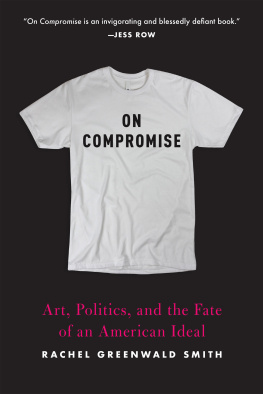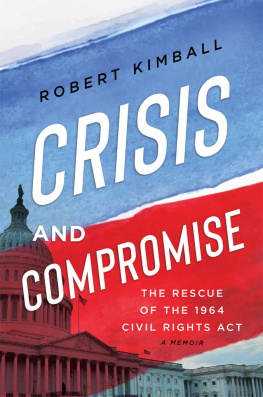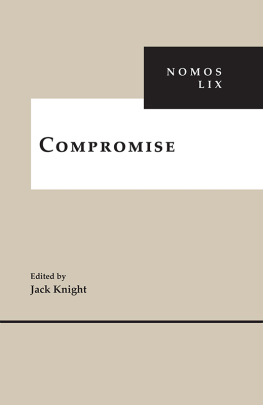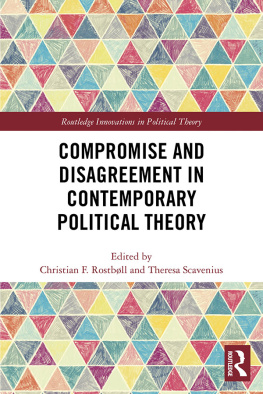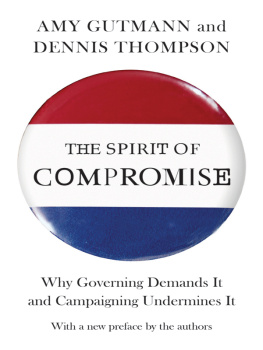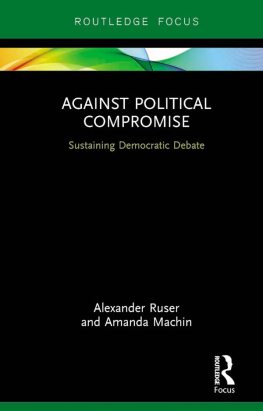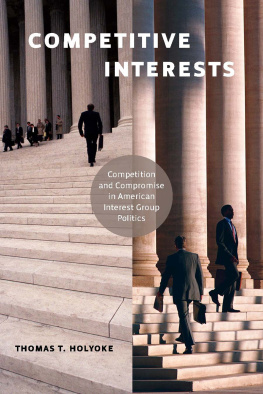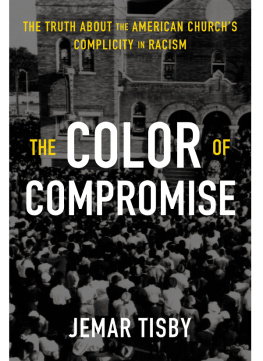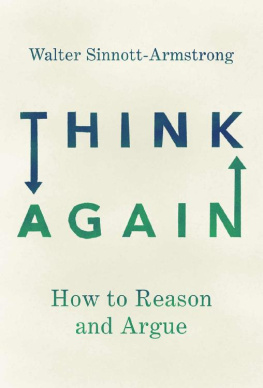ON COMPROMISE
Art, Politics, and the Fate of an American Ideal
RACHEL GREENWALD SMITH
Graywolf Press
Copyright 2021 by Rachel Greenwald Smith
The author and Graywolf Press have provided this e-book to you for your personal use only. You may not make this e-book publicly available in any way. Copyright infringement is against the law. If you believe the copy of this e-book you are reading infringes on the authors copyright, please notify Graywolf Press at: us.macmillanusa.com/piracy.
This publication is made possible, in part, by the voters of Minnesota through a Minnesota State Arts Board Operating Support grant, thanks to a legislative appropriation from the arts and cultural heritage fund. Significant support has also been provided by the National Endowment for the Arts, Target Foundation, the McKnight Foundation, the Lannan Foundation, the Amazon Literary Partnership, and other generous contributions from foundations, corporations, and individuals. To these organizations and individuals we offer our heartfelt thanks.

This is a work of creative nonfiction. The events, places, people, and conversations depicted here have been re-created from memory and some have been compressed, summarized, or otherwise altered.
Published by Graywolf Press
250 Third Avenue North, Suite 600
Minneapolis, Minnesota 55401
All rights reserved.
www.graywolfpress.org
Published in the United States of America
ISBN 978-1-64445-060-4
Ebook ISBN 978-1-64445-153-3
2 4 6 8 9 7 5 3 1
First Graywolf Printing, 2021
Library of Congress Control Number: 2020944179
Cover design: Carlos Esparza
Cover image: raindes
For Ted
the centre cannot hold
W. B. YEATS (1919)
The center wont hold
SLEATER-KINNEY (2019)
IMAGES
ON COMPROMISE
CALL AND RESPONSE: AN INTRODUCTION
Show me what democracy looks like.
This is what democracy looks like , I reply to the call of the chant leader as hundreds of us march directly into a dead end. As we turn around and begin fighting our way against the crowd, which is surging toward the same sad fate, my friends and I discuss the obvious irony, that this is, unfortunately, exactly what democracy looks like: a passionate crowd stuck in a disoriented scrum.
We look for someone in charge. Finally, we find a lone shouter in a fluorescent green vest trying to make herself heard above the chants, waving her arms behind signs proclaiming the virtues of equality, her tiny voice barely audible even when we are right next to her. One more block and turn right , she says. And I cant help a thought that has nagged at me since I was a child. It is a shameful thought because it is a profoundly antidemocratic thought, one that verges on all of the things we are protesting: chauvinism, tyranny, authoritarianism.
The thought is this: Why doesnt everyone just shut up and listen to the person in charge?
The philosopher Jacques Rancire tells me that my hatred of democracy is ancient. It is as old as democracy itself, he writes, going on to explain that the word was initially used as an insult by those who saw in the unnameable government of the multitude the ruin of any legitimate order. My snarky interpretation of this is what democracy looks like draws from an older definition of the word democracy than the celebratory intentions of the chant itself.
Still I chant. Eventually, our group of confused citizens makes it to the main artery of the march. And as I chant, I mean both things at once. This is what democracy looks like : an incoherent mess of people who arent listening, a crowd that cant see its own organizing principles, individuals who will not sacrifice their drive to get where they are going to an overarching plan. But also this is what democracy looks like : thousands of people demanding to be heard, thousands of people managing to keep one another safe without any clear direction. It looks like the possibility for collectivity, self-governance, and solidarity.
Because democracy refuses absolute authority, it requires a general acceptance of dissenting views, comfort with internal conflict, ad hoc alliances, and discouraging capitulations. And democracy requires compromises. Ugly, makeshift, disappointing compromises.
I am at the 2017 Womens March in Washington, DC, as a result of several such compromises. I have compromised on my skepticism toward large, permitted marches. I have compromised on my distrust of mainstream white feminism. I have compromised on my parenting, having left my kid at home for yet another weekend.
I have made these compromises, but I cannot satisfactorily account for them. When, two years later, in a class I am teaching about manifestos, a student presenting on the marchs framing documents dismantles them in a convincing performance of intersectional analysis, I will have no justification for having been there, another middle-class white woman tumbling down the first knoll of middle age, shaking her fist at the impermeable edifices of governmental buildings and monuments. I will give the student an A, attesting on the evaluation sheet to a successful performance of everything I have taught: rigorous close analysis, a nuanced approach to contemporary pieties, a virtuosic performance of no-holds-barred critique. And I will feel conflicted, because I will recognize myself both in the compromiser, the person who went to the march despite all of its problems, and in the critic, the person who condemns such actions.
I am always finding myself in this trap, playing either the sellout or the hypocrite, the shill or the ideologue. All around me, I see vocal affirmations of one stance and strident disavowals of the other. You are either pathetically moderate or naively radical; an apologist or a purist.
Both of these positions, however, strike me as impossible to sustain. To take an absolute stance of refusal involves engaging in a Sisyphean process of self-purification, trying to scrub away the filth of complicity that will nevertheless continue to accrete simply from getting up and walking around in all of the rotten systems that undergird contemporary existence. As Alexis Shotwell writes in Against Purity , We are compromised and we have made compromises . There is no food we can eat, clothing we can buy, or energy we can use without deepening our ties to complex webs of suffering.
But to say yes to compromise, to believe, as Shotwell writes, that compromise will be how we craft the worlds to come, whatever they might turn out to be, to say that because our current systems are rotten we simply need to learn to live, make peace, and innovate within them seems like the worst abdication of justice. I want to find a way of making compromises without celebrating them, to know the difference between compromise as a means and compromise as an end.
<><><>
Compromises often seem either obviously goodas when intractable conflicts find a resolution because both parties agree to give something up in exchange for a solution that benefits everyoneor obviously bad, as in the accusation that one has compromised on ones values and is therefore ethically suspect, or disloyal. The philosopher Avishai Margalit places compromises in two categories. Most compromises, he argues, are political goods. But there are also rotten compromises, those that establish or maintain a regime of cruelty and humiliation. This seems like a strong enough distinction, but accounting for specific cases predictably gives Margalit trouble. Was collaborating with the Stalinist regime in order to defeat Hitler ethically defensible? Were the slavery compromises in the US Constitution justified? Ultimately, he answers both of these in the affirmative. I find this unsatisfying, not because I disagree with his answers, though I might come to different conclusions, but because for me the very notion that compromises are either righteous or rotten involves seeing compromises as finished things that either shimmer or stink.

